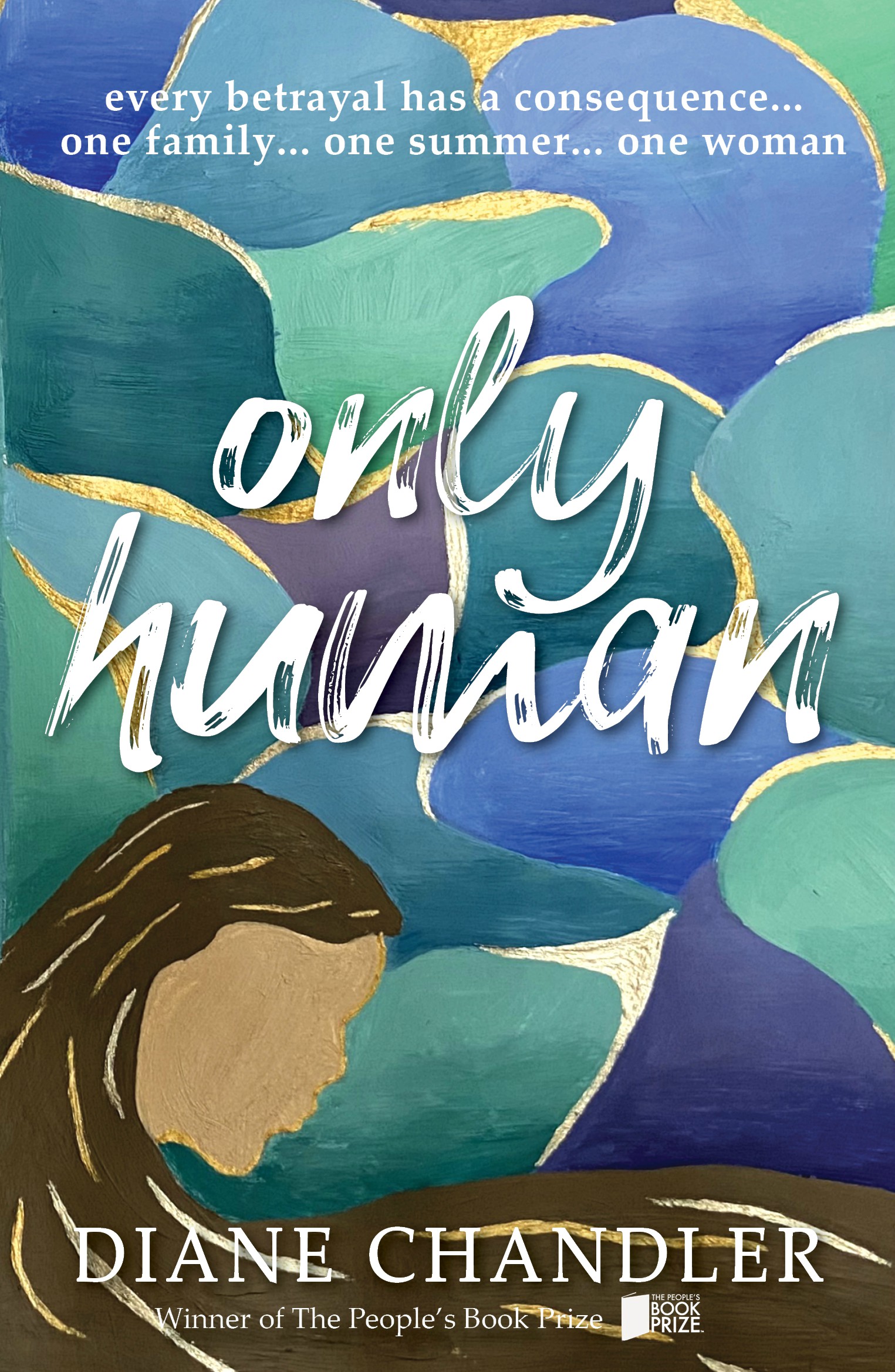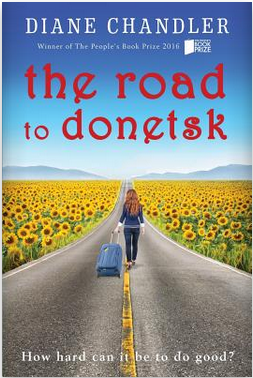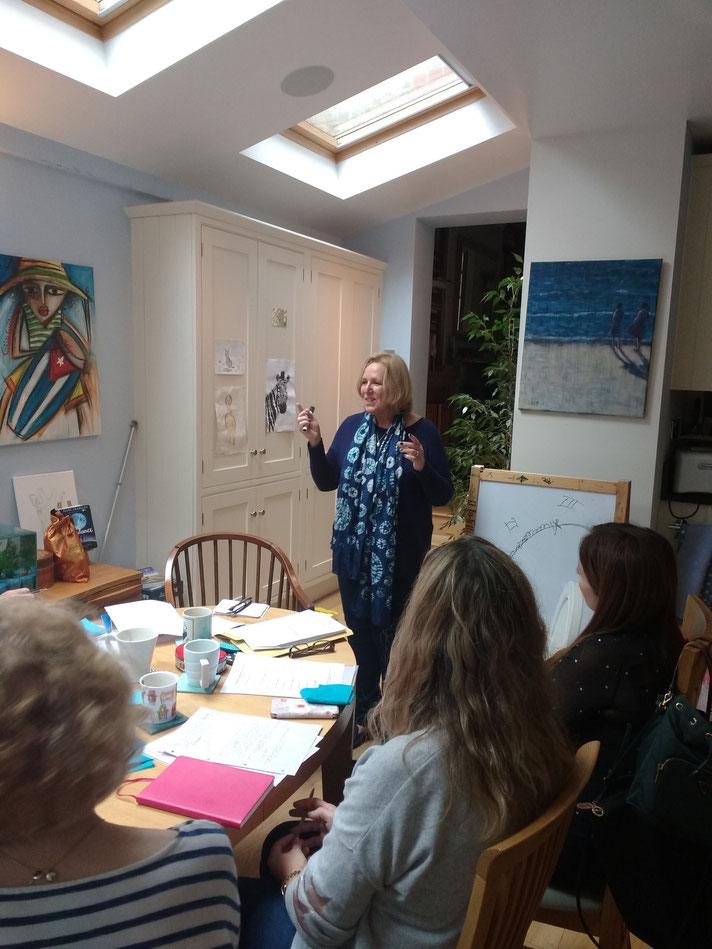This week we talk to prizewinning author, Diane Chandler
Q: Hi, Diane Chandler, how are you doing? What have you been up to so far this year?
Thanks so much for choosing me as a featured author. I’ve had a busy year so far doing what I love, which is anything around reading and writing! I’ve tentatively begun work on my fourth novel, which is set in Cuba, and I plan to plunge myself into writing more once my daughter goes off to university later this month.
I’ve also been busy teaching online writing workshops. Additionally, I offer one-to-one personal coaching and have been working with a couple of aspiring authors this year too. I was so lucky to get away for a summer holiday, where I read as many books as possible; my way of restoring and recharging!
Q: Only Human, your latest novel, is about Anna Bond, a wife and mum, who appears to be having a midlife identity crisis. Do you expect readers who relate to this protagonist’s experience to gain any comfort or is it all about events overtaking a character as they hurtle towards catastrophe?
That’s a great question! Well, I was inspired to write Only Human because I knew so many women around me who were floundering as their children were becoming independent and then leaving home. It was their time again and these women were keen to find some occupation, some passion, which would take them through the second half of their lives.
Anna Bond is such a woman, and her husband has had an affair to boot, so she really struggles when her daughter begins to chop at the apron strings – especially since she gave up a successful career to be a stay-at-home mum. On her quest, she makes a series of questionable decisions (some of them bordering on catastrophic) but, finally, she does find her passion and ends up contented with her lot and feeling comfortable in her own skin.

Q: You worked as a political lobbyist, then for the European Commission, and finally moved to the UK’s Department for International Development before becoming a writer. Was there something about this career that inspired you to be an author or was it a long-held ambition finally realised?
Well, my career was all about communication, especially writing – documents, briefs, speeches, aid programmes – but I’d always dabbled with creative writing at the weekends. I only really set about it properly when I gave up work to embark on fertility treatment. As a stay-at-home mum, I was then able to snatch an hour here and there.
I have a terrible first-draft novel hidden deep at the back of a dark drawer that will never see the light of day. And I found a publisher for my first novel, The Road to Donetsk, just as my daughter began secondary school. Writing is my ultimate passion in life and so absorbing that I’m not aware of time passing while I’m deep inside my story.
Q: Your background in regeneration and international aid certainly seems to have inspired The Road to Donetsk, for which you won the People’s Book Prize for Fiction in 2016. How did you balance your lived experience of Ukraine with the need to create a gripping love story?
Another great question! With The Road to Donetsk, I wanted to explore the world of overseas aid and bring it to life for the reader – to show how the aid business really works on a daily basis. And I can tell you that it’s not the touchy-feely, altruistic vocation that many people believe it to be. But I also wanted to make accessible all that I had to say about aid to a wide range of readers, so I wove a love story around this.
I took an idealistic young English woman, who goes out to Ukraine thinking she can ‘save the world’, and I paired her up with a cynical older American man who knows that you can’t. I think that I am somewhere between the two of them.
Ukraine and its people totally got under my skin during the years that I was working on aid programmes there and the novel is also a love letter to the country. When I won the People’s Book Prize I dedicated it to the Ukrainian people. That was a wonderful night at the ancient Stationers’ Hall in the City of London – new frock and everything – and I got to meet Frederick Forsyth, who presented the glass statue to me. It sits on my mantelpiece and I still stroke it occasionally!

Q: You also host an online book club – The Chiswickbuzz Book Club. Do you think book clubs could or do work in schools?
I was asked to host this online book club at the beginning of lockdown last year and I have absolutely loved every single session. We began fortnightly and slowed down the pace to monthly once lockdown eased. We’ve been so lucky to have had several authors join us, including one of my favourites, David Nichols, who wrote One Day.
Wouldn’t it be wonderful if children were encouraged to join a book club at school? It’s very special discussing the characters, plot and setting of a book with others and listening to their points of view, which are often quite different from your own. We all bring ourselves to a book – our own lives, experiences and imaginations – and discussions about stories with others can be so illuminating.
I’m sure it’s still the case today that school pupils must learn aspects of creative writing for their exams, such as metaphor, personification and alliteration. Identifying these techniques in a book they’re reading for fun and discussing with their friends is so enriching. I had a wonderful English teacher at school, who I can still picture standing at the front of the class explaining what a metaphor was, using ‘The sea is a hungry dog’ from The Sea by James Reeves. I’ve never forgotten the image I had of a huge ‘Dulux’ dog (Old English Sheepdog) bounding onto shore, the smell of the sea, the froth of its waves…
Q: You run Creative Writing Workshops London. Can you tell us how this came about and what it aims to do?
I was asked to speak about ‘How to Write a Novel’ at an event for Women Returners, as a kind of soft side-show to illustrate how they might spend their spare time. Afterwards, so many women came up to me to say that they had not written creatively since school but had loved it back then and were inspired to give it another go. My publisher and editor, Stephanie Zia, was with me that day and we decided then to share our passion for creative writing with the world! We began around my kitchen table, offering homemade brownies and endless coffee – for a maximum of eight people to keep it cosy and safe.
Since lockdown, we’ve gone online and run regular one-hour workshops, still in small groups, with the emphasis on fun. It’s all about unleashing the imagination and tapping into that childhood imagination, which is boundless. You can check out our website for our autumn programme. We generally teach adults, but if there was a group of children who wanted to try us out, then I’m sure that we could adapt something and give it a go. Let’s face it, children are masters of imagination!

Q: 1 in 8 schools across Britain do not have a library – have you had experience of the educational inequality within the school system or met anyone who has?
I actually didn’t know that and I find that figure alarming. When I came across your fabulous initiative, Books2All, I was immediately drawn to support you by spreading the word on social media and around my own neighbourhood. I’ve also been digging out any books we may still have from my daughter’s childhood that might be of value to post on your brilliant app.
Of course, books transport us all to another world and libraries are the crux of that experience. For those who are struggling with life, they can be a place to dream and just ‘be’ for a while. My husband is a governor at a state primary school and he often reports on both the lamentable budget allocated and, alongside that, the incredible personal input by staff, who often give up so much of their time after school, or even get up a ladder to paint the walls!
A close friend of mine set up a children’s wellbeing company, B.E.S.T, for bespoke emotional and social teaching, which focusses on helping the less privileged pupils at primary level with after-school clubs. I must say that I find the work she does quite humbling.
Q: What book or books do you think all children in schools should be given to read?
I would say any books that transport them to some imagined or magical world, where they can linger for a while. Somewhere they might escape, be soothed, stimulated or inspired. As a child, I read Enid Blyton and can still see those kids having adventures on an island with Timmy the dog. I can’t drink ginger beer without visualising the lashings of the stuff they shared!
At primary school, my daughter loved a series of simple books on Greek mythology and another on the works of Shakespeare; both series were simplified for young children without losing any of their wonder. She also loved Roald Dahl, of course, and later a series of history books about fictional children being present at a key historical event, such as RMS Titanic, or Pompeii. Anything that inspires basically.
Q: Ok, so the final question, Diane Chandler – if all the libraries in the world were burning and you could only save three books, what would they be and why?
Okay, I guess I should say The Bible, the Complete Works of William Shakespeare and possibly The Oxford English Dictionary. However, I have a wonderful oil painting of book spines in my kitchen, created by a friend for a special birthday, that illustrates my favourite 20 novels of all time. It includes my absolute favourite – Birdsong by Sebastian Faulks so I would definitely save that one.
The opening chapters are about a carefree young man, Stephen, who arrives in Amiens with his job, lodges with a well-to-do family and begins a torrid affair with the unhappily married wife. It’s a tale of lust and burning love, which we readers experience in all its sizzling detail. Then World War One breaks out and Stephen finds himself recruited to the trenches, going over the top, firing and being fired at.
To think that all those older men, who parade or are pushed in wheelchairs at the Cenotaph on Remembrance Day, were once vivacious young men, alive with lust and vigour. It is this juxtaposition in the novel that has always stayed with me and makes it my favourite novel.
Thank you for visiting our blog. Our vision here at Books2All is a world where every child finds the books that help them reach their true potential. If you have spare books in good condition at home that you think might be appropriate for school children or represent a school and would like to register to receive donated books, please download the Books2All app from the App Store or Google Play.

